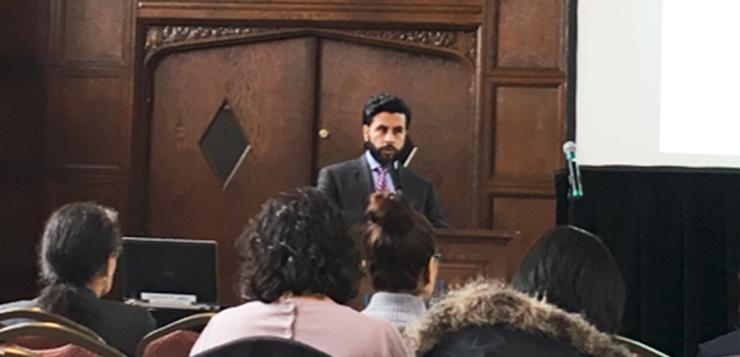Each day around 600 people go to the Mexican Consulate for assistance, according to Marcelino Miranda, the Consul of Legal Affairs at the Mexican Consulate. Miranda said in Illinois there are 1.8 million Mexicans who are not informed or know their rights. DePaul had 3,501 Hispanic/Latino students enrolled in 2016 who made up 16 percent of students.
Miranda led an information session on April 4 in Cortelyou Commons. He discussed the services the Consulate offers to Deferred Action for Childhood Arrivals (DACA) students and the rest of the immigrant population in Illinois.
Miranda recognizes that many in the immigrant and Mexican community are scared because they keep hearing about people being detained on the street, trains, schools and other massive raids. However, he said 95 percent of this is fake or false news.
“This panic is making people go into the shadows,” Miranda said. The Consulate provides psychological assistance and uses their hotline to help people stay calm and informed.
90 percent of people being deported are people coming from prison. However, Miranda said “we don’t call people criminals, it’s people who committed a crime.”
The Consulate is trying to keep people calm and assure DACA students that there will not be any changes at the moment. Miranda encourages DACA students to take advantage of scholarships and other opportunities, actively participate and encourage their relatives to apply for permanent residency. Students should not worry that the government will get their information if they want to apply or reapply for DACA, according to Miranda. He also said undocumented students should continue raising their voices and participating but with cautioned them to avoid getting in any trouble.
A DePaul staff member from the Office of Undergraduate Admissions told Miranda that students are sometimes scared to self-identify even though the information they share is confidential. She said she has seen a lot of students identify as international students even though they are undocumented or DACA recipients. She said doing this skews the services or scholarship opportunities they have because international students and undocumented students have to be supported differently.
Elizabeth Ortiz, Vice President for Institutional Diversity and Equity, said the University decided to hold the event because faculty and staff said their students are fearful and concerned about the new administration’s policies.
According to Ortiz, the university plans on holding a similar event in the fall with other consulates in addition to the Mexican Consulate. She said they will try to communicate information about the event to students through SGA and Latino student organizations on campus to encourage more students to attend.
Ortiz said the more information DePaul gives out, the more knowledgeable students will be and be able to better concentrate on their studies.
DePaul is trying to increase resources for immigrant students in several ways according to Ortiz. The university has been working on an initiative for the last five years and are meeting more frequently now.
There is a DREAM working group, that will likely be renamed to undocumented student working group, which has been meeting regularly.
Attorney Mary Stark, Associate General Counsel for the Office of the General Counsel at DePaul, said she attended the information session because she represents the legal office on the DREAM working group. She was very excited to hear what Miranda had to say to help support students.
“I had no idea they could help with DACA and help with legal resources, so that is something we will probably promote as a resource going forward,” Stark said.
The DREAM working group is trying to educate faculty and staff so that they can help students find the right resources, according to Ortiz. She said the DREAM Resource Guide is currently being revised to possibly change the name to Undocumented Student Guide and make it more accessible to students.
An immigrant and refugee website was created where students can go for self-help and to find information on counseling and legal services such as that the DePaul legal clinics are offering pro bono legal advice.
“We are trying to take all the resources of the University and put it in one place,” Ortiz said.
Ortiz said she wanted to make it clear that DePaul does not collect social security numbers or ask students if they are undocumented. In light of the Trump administration’s increased scrutiny of undocumented students, university officials will continue to educate the campus community on policies and procedures to best protect students.


